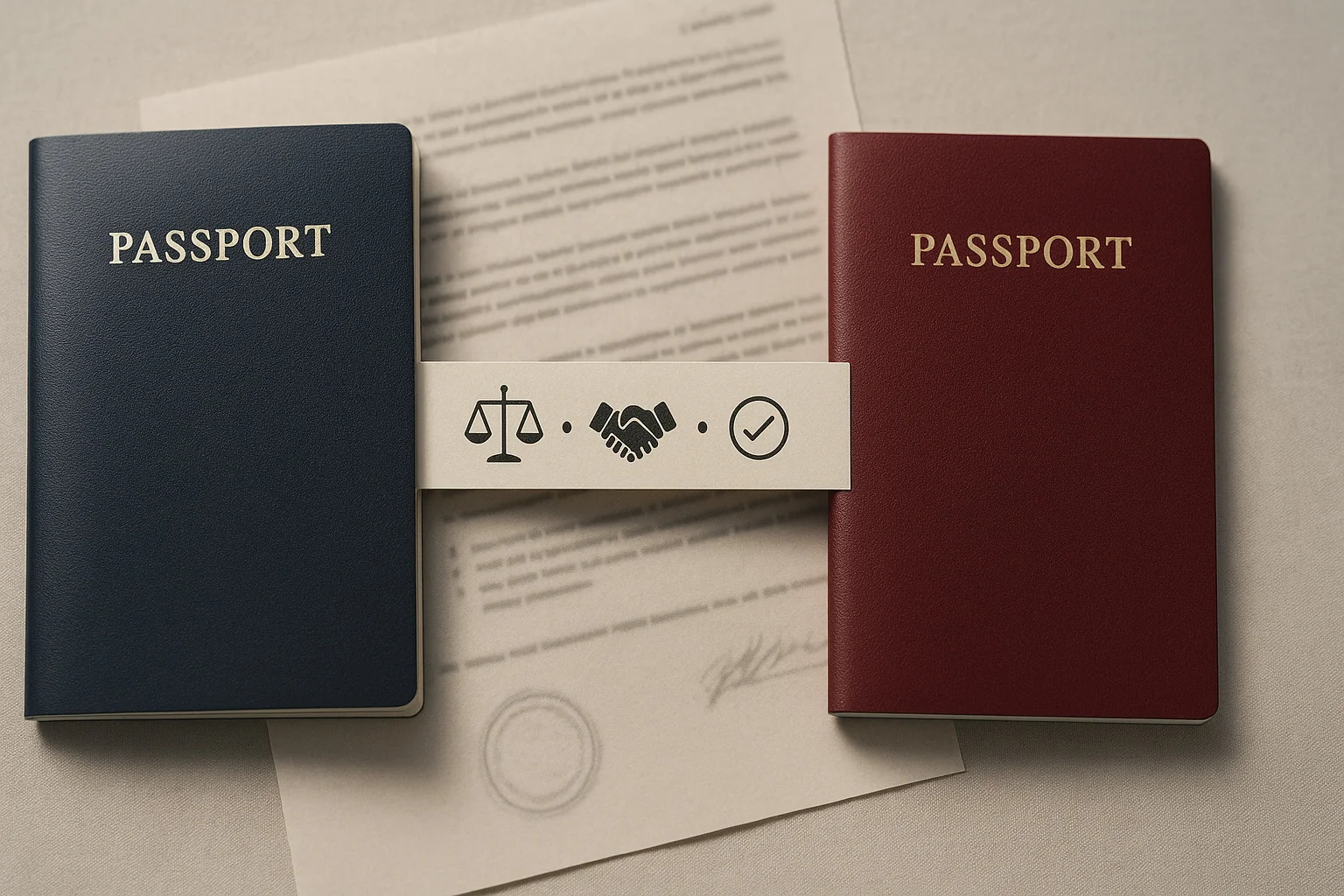Dual Citizenship Rules (2025): Countries, Restrictions, Benefits
120
9/23/2025

Dual Citizenship Rules (2025): Countries, Restrictions, Benefits
Dual citizenship allows individuals to be legally recognized as citizens of two (or more) countries at the same time. In 2025, rules differ widely: some states embrace multiple nationalities, others restrict or ban them. This guide explains where dual citizenship is allowed, the benefits, the risks, and what to check before applying for a second passport.
Key terms in 20 seconds
- Dual citizenship: holding nationality in two states simultaneously, with rights and duties in both.
- Restricted dual citizenship: allowed only under certain conditions, such as birth or marriage.
- Prohibited dual citizenship: laws require renunciation of previous nationality before naturalisation.
- Renunciation: the legal process of giving up a nationality.
Global landscape of dual citizenship in 2025
More than half of the world’s countries now tolerate dual citizenship, especially across Europe and the Americas. Others impose restrictions, often for political or security reasons.
Dual citizenship rules by region — 2025 comparison
| Region | Countries allowing dual citizenship | Restricted or conditional | Prohibited |
|---|---|---|---|
| Europe | UK, Ireland, France, Italy, Portugal, Greece, Malta | Germany (allowed from 2024 reforms), Spain (limited to Ibero-American & select nationals) | Austria (prohibited unless special authorisation) |
| Americas | USA, Canada, Mexico, Brazil, Argentina | Chile (requires notification), Colombia (service restrictions) | None |
| Middle East | Israel, Lebanon | UAE (only by presidential discretion for investors/professionals) | Saudi Arabia, Qatar, Kuwait |
| Asia-Pacific | Australia, New Zealand, Philippines | India (offers OCI, not full dual citizenship), Japan (must choose at 20s) | China, Singapore, Indonesia |
| Africa | South Africa, Nigeria, Kenya | Egypt (requires permission), Tanzania (under review) | Ethiopia (historically restricted, some reforms ongoing) |
Benefits of dual citizenship
- Mobility: wider visa-free access and more residency options.
- Economic: ability to own property or run businesses in two states.
- Social: access to healthcare, education, and social benefits in both countries.
- Family security: easier relocation and reunification across borders.
Challenges and risks
- Military service: some countries require conscription regardless of dual status.
- Taxation: dual citizens may face double taxation (e.g., USA taxes globally).
- Diplomatic protection: in the country of residence, your “home” passport may not help.
- Loss of nationality: naturalising in a prohibitive country can mean automatic loss of original citizenship.
Best for whom
- Investors: benefit from property rights and business access in multiple markets.
- Families: smoother relocation, education, and healthcare options.
- Professionals: wider career opportunities without visa barriers.
- Students: access to domestic tuition fees and scholarships in two states.
Mini case #1 — USA & Italy
An American of Italian descent applies for Italian citizenship jure sanguinis. They retain their U.S. citizenship while gaining EU mobility, dual tax obligations, and expanded family rights.
Mini case #2 — Spain & Colombia
A Colombian national naturalises in Spain. Thanks to Ibero-American treaties, they keep Colombian nationality while acquiring Spanish citizenship after two years of residence.
Mini case #3 — UAE investor
A professional is granted Emirati citizenship by presidential discretion while keeping their original nationality. Benefits include long-term residence and business access, but revocation risk exists.
How to check your eligibility
- Review home country’s dual citizenship laws.
- Check destination country rules (does it allow retention?).
- Consult legal experts on tax and military obligations.
- Collect documents proving descent, residence, or investment.
- Apply through official consulates or migration offices.
Two expert notes
“Dual citizenship offers flexibility but requires careful tax and legal planning.” — Carrie, Head of Sales
“Some states tolerate it informally but still apply strict rules — always confirm before naturalising.” — Daniel, Legal Counsel
Common mistakes (and quick fixes)
Assuming all EU states allow dual citizenship → many still restrict or ban. Forgetting tax implications → check double taxation treaties. Assuming informal tolerance = legal approval → always confirm via official law.
FAQ
Which EU countries allow dual citizenship? UK, Ireland, France, Italy, Portugal, Greece, Malta, and most EU states (with exceptions). Which countries prohibit dual citizenship? Austria, China, Singapore, Saudi Arabia, Qatar, among others. Can I lose my original nationality? Yes, if your home country prohibits dual status and automatically revokes nationality. Does dual citizenship mean double taxation? Not always — depends on treaties; but U.S. citizens are taxed globally.
What this article answers
- Which countries allow, restrict, or prohibit dual citizenship in 2025?
- What are the benefits and risks of holding two passports?
- How do military, tax, and diplomatic rules affect dual nationals?
- What steps are needed to check eligibility?
For structured comparisons and expert assistance, explore our materials and see detailed guidance. VelesClub Int. helps applicants evaluate dual citizenship rules, avoid compliance risks, and manage safe filings worldwide.
Are there any questions or do you need advice?
Leave a request
Our expert will contact you to discuss tasks, choose solutions and be in touch at each stage of the transaction.
